Country: Bolivia,
When did this experience begin?: 04/11/2013
At what stage is the experience currently?: With proven impact, on the way to consolidation
Is the experience legally recognized?: Yes
Where does the experience take place?:
Name of the organization leading the experience: COMUNIDAD DE NUEVA ESPERANZA
Year in which it was established: 04/11/2013
Acronym (initials) of the organization: SAFC
Logo of the organization: 
Description of the Organization:
Address of the organization's headquarters: localidad de PUERTO MORALES
Context:
![]()
Social Issues:
Public healthLabor disputes
![]()
Cultural Issues:
Loss of cultural identityImposition of external models
![]()
Political Issues:
Absence of public institutions
![]()
Economic Issues:
Livestock FarmingWildlife Trafficking
![]()
Environmental Issues:
PollutionDeforestationDegradationDroughtsDeterioration of water sourcesClimate changeForest firesDestruction of ecosystems
| Title | Unit | Number | Description |
|---|
Partners or Allied Organizations
| Organization Name | Organization Role in the Experience |
|---|---|
| Pastoral Social Caritas Departamento de Pando | Aliada |